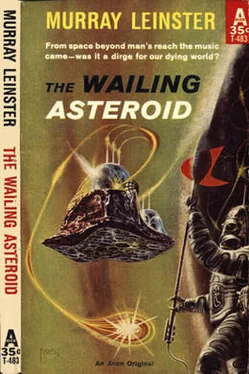Holmes, still pale, asked, "How'd we get away from that rocket?"
"We accelerated," said Burke. "It was a defensive rocket. It was designed to knock down jet bomb carriers or ballistic missiles which travel at a constant speed. Target–seeking missiles can lock onto the radar echo from a coasting ship, or one going at its highest speed because their computers predict where their target, traveling at constant speed, can be intercepted. We were never there. We were accelerating. Missile–guidance systems can't measure acceleration and allow for it. They shouldn't have to."
Four of the six television screens showed dark sky with twinkling lights in it. On one there was the dim outline of the sun, reversed to blackness because its light was too great to be registered in a normal fashion. The other screen showed Earth.
There was a buzzing, and Keller looked at Burke.
"Rocket?" asked Burke. Keller shook his head. "Radar?" Keller nodded.
"The DEW line, most likely," said Burke in a worried tone. "I don't know whether they've got rockets that can reach us. But I know fighter planes can't get this high. Maybe they can throw a spread of air–to–air rockets, though…. I don't know their range."
Sandy said unsteadily, "They shouldn't do this to us! We're not criminals! At least they should ask us who we are and what we're doing!"
"They probably did," said Burke, "and we didn't answer. See if you can pick up some voices, Keller."
Keller twirled dials and set indicators. Voices burst into speech. " Reporting UFO sighted extreme altitude coördinates—First rocket exhausted fuel in multiple attacks and fell, sir. " Another voice, very brisk, " Thirty–second squadron, scramble! Keep top altitude and get under it. If it descends within range, blast it! " Another voice said crisply, " Coördinates three–seven Jacob, one–nine Alfred…. "
Keller turned the voices down to mutters because they were useless.
Burke said, "Hell! We ought to land somewhere and check over the ship. Keller, can you give me a microphone and a wavelength somebody will be likely to pick up?"
Keller shrugged and picked up masses of wire. He began to work on an as yet unfinished wiring job. Evidently, the ship was not near enough to completion to be capable of a call to ground. It had taken off with many things not finished. Burke, at the controls, found it possible to think of a number of items that should have been examined exhaustively before the ship left the mould in which it had been made. He worried.
Pam said in a strange voice, "I thought I might rate as a heroine for stowing away on this voyage, but I didn't think we'd have to dodge rockets and fighter planes to get away!"
There was no comment.
"I'm a beginner at navigation," said Burke a little later, more worried than before. "I know we have to go out over the north magnetic pole, but how the hell do I find that?"
Keller beamed. He dropped his wiring job and went to the imposing bank of electronic instruments. He set one, and then another, and then a third. The action, of course, was similar to that of an airline pilot when he tunes in broadcasting stations in different cities. From each, a directional reading can be taken. Where the lines of direction cross, there the transport plane must be. But Keller turned to shortwave transmitters whose transmissions could be picked up in space. Presently, eighty miles high, he wrote a latitude and longitude neatly on a slip of paper, wrote "North magnetic pole 93°W, 71°N, nearly," and after that a course.
"Hm," said Burke. "Thanks."
Then there was a relative silence inside the ship. Only a faint mutter of voices came from assorted speakers that Keller had first turned on and then turned down, and a small humming sound from a gyro. When they listened, they could also hear a high sweet musical tone. Burke shifted this control here, and that control there, and lifted his hands. The ship moved on steadily. He checked this and that and the other thing. He was pleased. But there were innumerable things to be checked. Holmes went down the ladder to the other compartment below. There were details to be looked into there, too.
One of the screens portrayed Earth from a height of seventy miles instead of eighty, now. Others pictured the heavens, with very many stars shining unwinkingly out of blackness. Keller got at his wires again and resumed the work of installing a ship–to–ground transmitter and its connection to an exterior–reflecting antenna.
Sandy watched Burke as he moved about, testing one thing after another. From time to time he glanced at the screens which had to serve in the place of windows. Once he went back to the control–board and changed an adjustment.
"We dropped down ten miles," he explained to Sandy. "And I suspect we're being trailed by jets down below."
Holmes meticulously inspected all storage places. He'd packed them when the ship lay on her side.
Burke read an instrument and said with satisfaction, "We're running on sunshine!"
He meant that in empty space certain aluminum plates on the outside of the hull were picking up heat from the naked sun. The use of the drive–shaft lowered its temperature. Metallic connection with the outside plates conducted heat inward from those plates. The drive–shaft was cold to the touch, but it could drop four hundred degrees Fahrenheit before it ceased to operate as a drive. It was gratifying that it had cooled so little up to this moment.
Later Keller tapped Burke on the shoulder and jerked his thumb upward.
"We go up now?" asked Burke.
Keller nodded. Burke carefully swung the ship to aim vertically. The views of solid Earth slid from previous screens to new ones. The stars and the dark object which was the sun also moved across their screens to vanish and reappear on others. Then Burke touched the drive–control. Once more they had the sensation of being in a rising elevator. And at just that moment spots appeared on the barren, icy, totally flattened terrain below.
They were rocket–trails from target–seeking missiles which had reached the area of the north magnetic pole by herculean effort and were aimed at the radar–detected little ship by the heavy planes that carried them.
From the surface of the Earth, it would have seemed that monstrous columns of foaming white appeared and rose with incredible swiftness toward the heavens. They reached on, up and up and up, seeming to draw closer together as they became smaller in the distance, until all eight of them seemed to merge into a single point of infinite whiteness in the sunshine above the world's blanket of air.
But nothing happened. Nothing. The ship did not accelerate as fast as the rockets, but it had started first and it kept up longer. It went scuttling away to emptiness and the bottoms of the towers of rocket–smoke drifted away and away over the barren landscape all covered with ice and snow.
When Earth looked like a huge round ball that did not even seem very near, with a night side that was like a curious black chasm among the stars, the atmosphere of tension inside the ship diminished. Keller completed his wiring of a ship–to–ground transmitter. He stood up, brushed off his hands and beamed.
The little ship continued on. Its temperature remained constant. The air in it smelled of growing green stuff. It was moist. It was warm. Keller turned a knob and a tiny, beeping noise could be heard. Dials pointed, precisely.
"We couldn't go on our true course earlier," Burke told Sandy, "because we had to get out beyond the Van Allen bands of cosmic particles in orbit around the world. Pretty deadly stuff, that radiation! In theory, though, all we have to do now is swing onto our proper course and follow those beepings home. We ought to be in harmless emptiness here. Do you want to call Washington?"
Читать дальше







